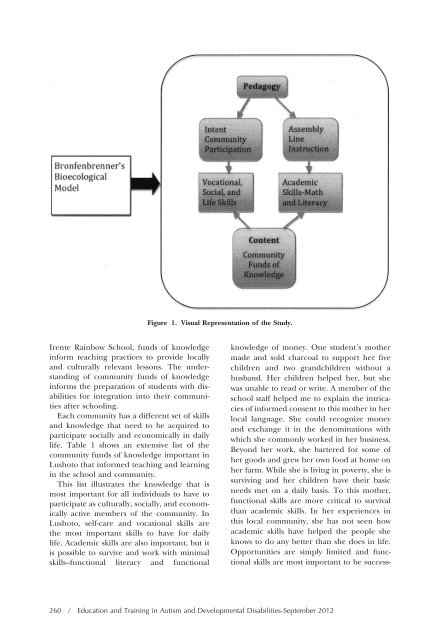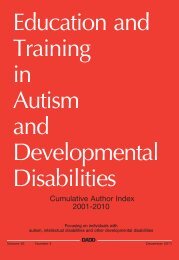etadd_47(3) - Division on Autism and Developmental Disabilities
etadd_47(3) - Division on Autism and Developmental Disabilities
etadd_47(3) - Division on Autism and Developmental Disabilities
You also want an ePaper? Increase the reach of your titles
YUMPU automatically turns print PDFs into web optimized ePapers that Google loves.
Irente Rainbow School, funds of knowledge<br />
inform teaching practices to provide locally<br />
<strong>and</strong> culturally relevant less<strong>on</strong>s. The underst<strong>and</strong>ing<br />
of community funds of knowledge<br />
informs the preparati<strong>on</strong> of students with disabilities<br />
for integrati<strong>on</strong> into their communities<br />
after schooling.<br />
Each community has a different set of skills<br />
<strong>and</strong> knowledge that need to be acquired to<br />
participate socially <strong>and</strong> ec<strong>on</strong>omically in daily<br />
life. Table 1 shows an extensive list of the<br />
community funds of knowledge important in<br />
Lushoto that informed teaching <strong>and</strong> learning<br />
in the school <strong>and</strong> community.<br />
This list illustrates the knowledge that is<br />
most important for all individuals to have to<br />
participate as culturally, socially, <strong>and</strong> ec<strong>on</strong>omically<br />
active members of the community. In<br />
Lushoto, self-care <strong>and</strong> vocati<strong>on</strong>al skills are<br />
the most important skills to have for daily<br />
life. Academic skills are also important, but it<br />
is possible to survive <strong>and</strong> work with minimal<br />
skills–functi<strong>on</strong>al literacy <strong>and</strong> functi<strong>on</strong>al<br />
Figure 1. Visual Representati<strong>on</strong> of the Study.<br />
knowledge of m<strong>on</strong>ey. One student’s mother<br />
made <strong>and</strong> sold charcoal to support her five<br />
children <strong>and</strong> two gr<strong>and</strong>children without a<br />
husb<strong>and</strong>. Her children helped her, but she<br />
was unable to read or write. A member of the<br />
school staff helped me to explain the intricacies<br />
of informed c<strong>on</strong>sent to this mother in her<br />
local language. She could recognize m<strong>on</strong>ey<br />
<strong>and</strong> exchange it in the denominati<strong>on</strong>s with<br />
which she comm<strong>on</strong>ly worked in her business.<br />
Bey<strong>on</strong>d her work, she bartered for some of<br />
her goods <strong>and</strong> grew her own food at home <strong>on</strong><br />
her farm. While she is living in poverty, she is<br />
surviving <strong>and</strong> her children have their basic<br />
needs met <strong>on</strong> a daily basis. To this mother,<br />
functi<strong>on</strong>al skills are more critical to survival<br />
than academic skills. In her experiences in<br />
this local community, she has not seen how<br />
academic skills have helped the people she<br />
knows to do any better than she does in life.<br />
Opportunities are simply limited <strong>and</strong> functi<strong>on</strong>al<br />
skills are most important to be success-<br />
260 / Educati<strong>on</strong> <strong>and</strong> Training in <strong>Autism</strong> <strong>and</strong> <strong>Developmental</strong> <strong>Disabilities</strong>-September 2012

















